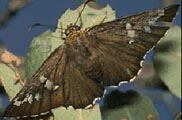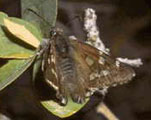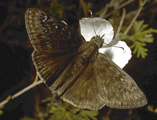Native Plants
Search for native plants by scientific name, common name or family. If you are not sure what you are looking for, try the Combination Search or our Recommended Species lists.
Quercus arizonica
Quercus arizonica Sarg.
Arizona White Oak, Arizona Oak
Fagaceae (Beech Family)
Synonym(s):
USDA Symbol: quar
USDA Native Status: L48 (N)
Medium-sized evergreen tree with irregular, spreading crown of stout branches. Arizona white oak is a large semi-evergreen oak up to 55 ft. tall. Its wide spreading branches are set conspicuously at right angles to the trunk, creating an irregular, spreading crown. Oblong leaves are shed in spring. One of the largest southwestern oaks, this handsome tree reaches its greatest size in canyons and other moist sites.
Plant Characteristics
Duration: PerennialHabit: Tree
Leaf Retention: Evergreen
Leaf Arrangement: Alternate
Leaf Complexity: Simple
Leaf Shape: Elliptic
Leaf Venation: Pinnate
Leaf Margin: Dentate
Leaf Texture: Leathery
Breeding System: Flowers Unisexual , Monoecious
Inflorescence: Catkin , Spike
Fruit Type: Nut
Size Notes: Height to 30 ft., width to 30 ft.
Leaf: Dull yellow-green to blue-green above.
Fruit: Acorn 1/2 to 1 inch long.
Bloom Information
Bloom Color: Yellow , GreenBloom Time: Mar , Apr , May
Bloom Notes: Males catkins yellow-green.
Distribution
USA: AZ , NM , TXNative Distribution: Mts. of Trans-Pecos, TX, w. to AZ; also n. Mex.
Native Habitat: Rocky mt. slopes & canyons; 5000 to 7500 ft.
Growing Conditions
Water Use: LowLight Requirement: Sun , Part Shade
Soil Moisture: Dry
Cold Tolerant: yes
Heat Tolerant: yes
Soil Description: Rocky and sandy soils. Clay Loam, Clay, Medium Loam, Rocky
Benefit
Use Ornamental: AttractiveUse Wildlife: Provides cover and food for turkeys, deer, javelinas, desert big horn sheep, quail and songbirds. Fruit-birds, Fruit-mammals, Substrate-insectivorous birds, Nesting site, Cover
Use Other: Although a good fuel, the hard wood is difficult to cut and split.
Attracts: Birds
Butterflies and Moths of North America (BAMONA)
|
Dull Firetip (Apyrrothrix araxes)  Larval Host |
Short-tailed Skipper (Zestusa dorus)  Larval Host |
Meridian Duskywing (Erynnis meridianus)  Larval Host |
Find Seed or Plants
View propagation protocol from Native Plants Network.
From the National Organizations Directory
According to the species list provided by Affiliate Organizations, this plant is on display at the following locations:Texas Parks and Wildlife Department - Austin, TX
Bibliography
Bibref 766 - Dale Groom's Texas Gardening Guide (2002) Groom, D.Bibref 1186 - Field Guide to Moths of Eastern North America (2005) Covell, C.V., Jr.
Bibref 298 - Field Guide to Texas Trees (1999) Simpson, B.J.
Bibref 1185 - Field Guide to Western Butterflies (Peterson Field Guides) (1999) Opler, P.A. and A.B. Wright
Bibref 355 - Landscaping with Native Plants of Texas and the Southwest (1991) Miller, G. O.
Bibref 291 - Texas Wildscapes: Gardening for Wildlife (1999) Damude, N. & K.C. Bender
Search More Titles in Bibliography
Additional resources
USDA: Find Quercus arizonica in USDA PlantsFNA: Find Quercus arizonica in the Flora of North America (if available)
Google: Search Google for Quercus arizonica
Metadata
Record Modified: 2021-02-27Research By: TWC Staff